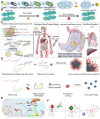Nanotechnology based gas delivery system: a "green" strategy for cancer diagnosis and treatment
- PMID: 39310098
- PMCID: PMC11413789
- DOI: 10.7150/thno.98884
Nanotechnology based gas delivery system: a "green" strategy for cancer diagnosis and treatment
Abstract
Gas therapy, a burgeoning clinical treatment modality, has garnered widespread attention to treat a variety of pathologies in recent years. The advent of nanoscale gas drug therapy represents a novel therapeutic strategy, particularly demonstrating immense potential in the realm of oncology. This comprehensive review navigates the landscape of gases endowed with anti-cancer properties, including hydrogen (H2), carbon monoxide (CO), carbon dioxide (CO2), nitric oxide (NO), oxygen (O2), sulfur dioxide (SO2), hydrogen sulfide (H2S), ozone (O3), and heavier gases. The selection of optimal delivery vectors is also scrutinized in this review to ensure the efficacy of gaseous agents. The paper highlights the importance of engineering stimulus-responsive delivery systems that enable precise and targeted gas release, thereby augmenting the therapeutic efficiency of gas therapy. Additionally, the review examines the synergistic potential of integrating gas therapy with conventional treatments such as starvation therapy, ultrasound (US) therapy, chemotherapy, radiotherapy (RT), and photodynamic therapy (PDT). It also discusses the burgeoning role of advanced multimodal and US imaging in enhancing the precision of gas therapy applications. The insights presented are pivotal in the strategic development of nanomedicine platforms designed for the site-specific delivery of therapeutic gases, heralding a new era in cancer therapeutics.
Keywords: Cancer treatment; Controlled release; Delivery systems; Gas therapy; Nanomedicine.
© The author(s).
Conflict of interest statement
Competing Interests: The authors have declared that no competing interest exists.
Figures








References
-
- Siegel RL, Miller KD, Fuchs HE, Jemal A. Cancer statistics, 2022. CA Cancer J Clin. 2022;72:7–33. - PubMed
-
- Herrmann J, Lerman L, Lerman A. Simply say yes to NO?. Nitric oxide (NO) sensor-based assessment of coronary endothelial function. Eur Heart J. 2010;31:2834–6. - PubMed
-
- Wang M, Yan J, Cao X, Hua P, Li Z. Hydrogen sulfide modulates epithelial-mesenchymal transition and angiogenesis in non-small cell lung cancer via HIF-1α activation. Biochem Pharmacol. 2020;172:113775. - PubMed
Publication types
MeSH terms
Substances
LinkOut - more resources
Full Text Sources
Medical

